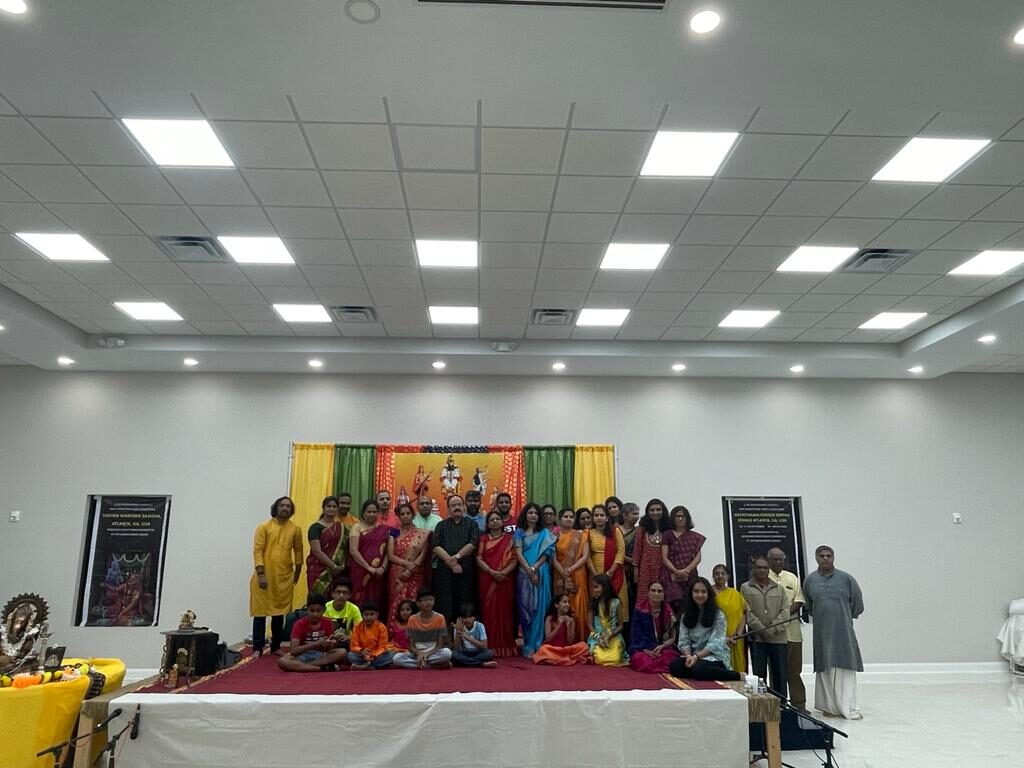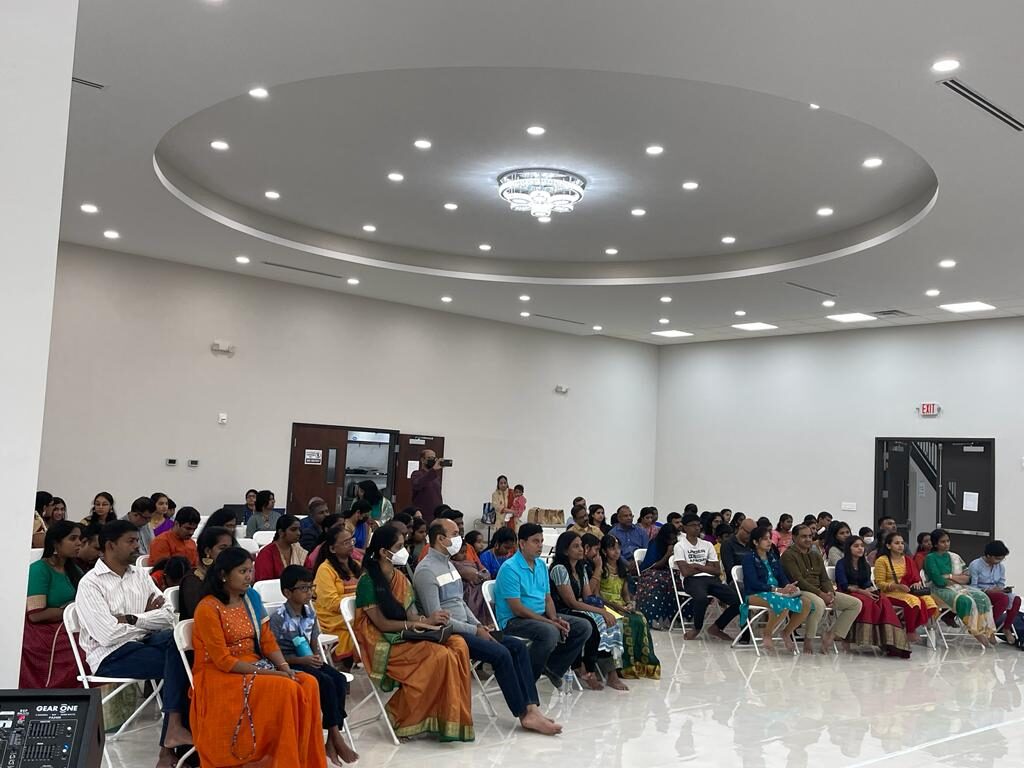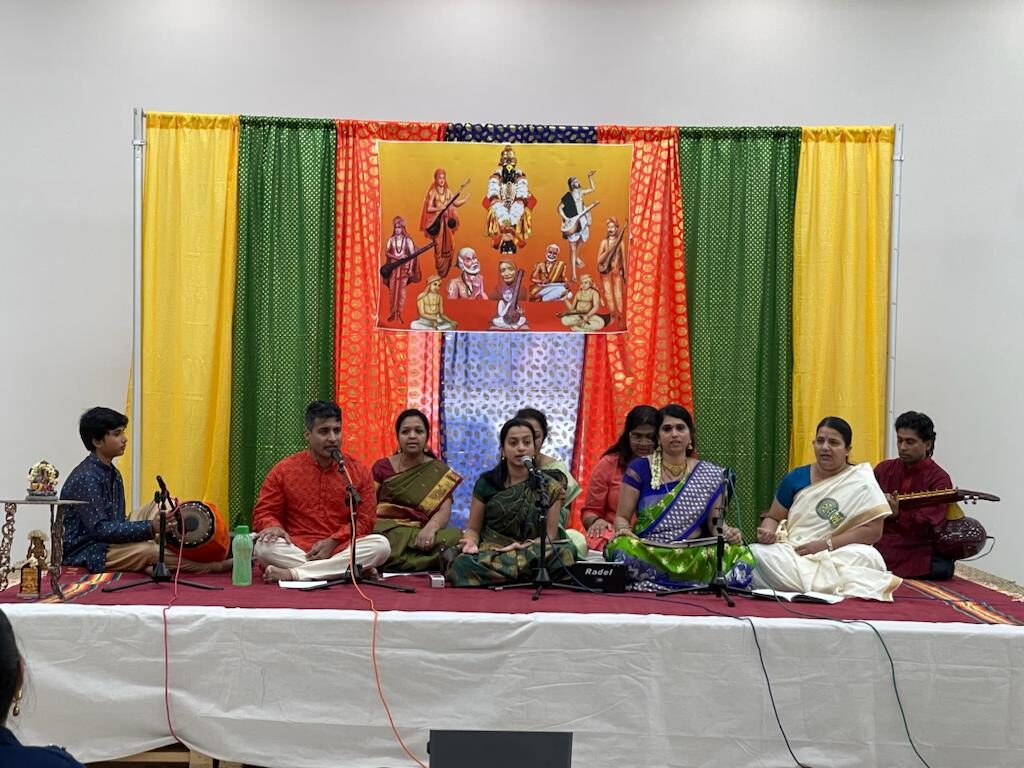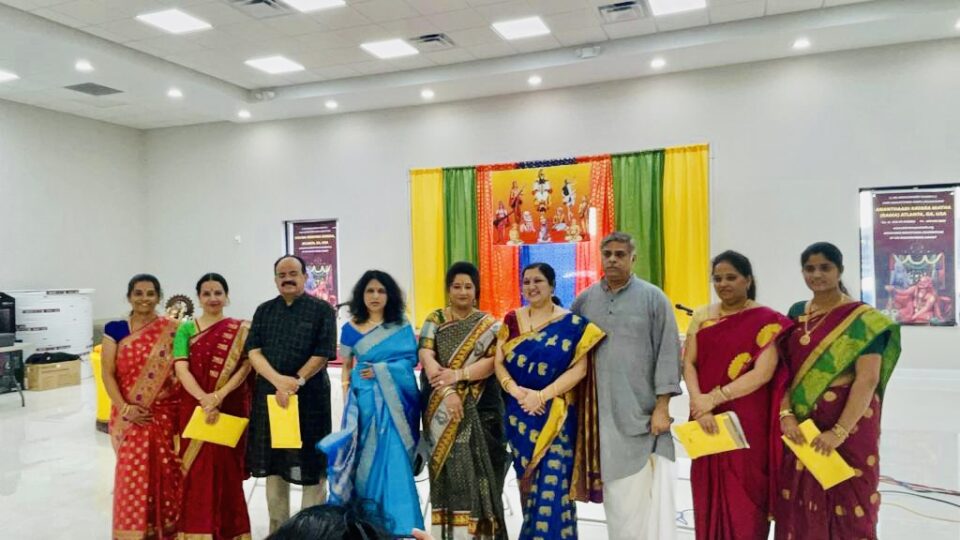BY JYOTHSNA HEGDE
Atlanta, GA, December 2, 2022: “Dasavani is very much relevant to our times. Just as food is required for the body to give strength, Dasavani is essential for nurturing good thoughts which provide great strength for the mind body and soul. It guides people in becoming better human beings, irrespective of religion,” Shri Puttur Narasimha Nayak, a popular Carnatic and Dasa composition singer told NRI Pulse during his Atlanta visit. Shri. Nayak presided as the guest of honor at the Daasara Aaradhane event, hosted by Ananthaadi Rayara Matha, Atlanta (RAMA) on November 6,2022 at the Gadhpurdham Hall in Norcross.
Shri. Nayak, on his ‘Dasavani’ tour across the US, mesmerized the audience with divine renditions of Dasara Padagalu, elaborating on the message and meaning of the lyrics. He also served as a Judge for a singing competition held earlier as part of Vidya Vaaridhi competition held by RAMA to showcase talent in varied areas of arts and literature.

Dedicated to Dasa Sahitya, the literature of bhakti movement composed by devotees in honor of Lord Vishnu or one of his Avatars, the all-day event featured classical dance and singing performances originally composed by the Haridasas, from various local talent with traditional Karnataka food cooked at the venue.
“The best part of Atlanta visit to me is the love and affection showered on us
by each and every person we met during this short visit,” Shri. Nayak said. Offering
a more profound explanation to the popular ‘Bagyada Lakshmi Baramma, which is
generally presumed to invite Lakshmi or money into a home, Shri. Nayak said it
also means that we are trying to move toward divinity by invoking Lakshmi we
also invoke Vishnu, who follows her.

“RAMA celebrated Daasara Aaradhane 2022 as a public event after 2 years of gap due to Covid. This year we had good gathering from morning till 3 PM with classical vocal, instrumental, dance and drama on haridaasa Kruti (compositions) performed by local talents. By the grace of Sri Hari vayu and Guru Rayaru, we had well known Carnatic haridaasa vocalist Sri. Puttur Narasimha Nayak accompanied by his wife and Sri. Raghunath on Tabla from India as our chief guests for daasa aaradhana day. RAMA also successfully arranged Vidya Vaaridhi 2022 competitions. Winners announcements were made by esteemed judges Sri. Puttur Narasimha Nayak, Smt. Sushma Mohan, Smt. Jyothsna Hegde, Smt. Aparna Turaga, Smt. Shilpa, Smt. Sowmya and Smt. Sridevi, (present at the event). On behalf of RAMA, I thank all the participants, judges, sponsors, organizers ,volunteers and audience for making the event memorable,” Pradeep Vittala Murthy, Founder, RAMA, said
RAMA Competitions had judges and participants from both the US and India.
Naada Taranga (Jugde: Shri Puttur Narasimha Nayak, Chaitra Gururaj, Anjana Nagaraj) Winners – Vaibhavi Vishwanath Mathapati and Varsha Danavandi; Nrutya Taranga (Judge: Sushma Mohan) Winners – Sadhana, Inchara Kiran; Vesha Taranga ( Judge: Deepashree Harish) Winners – Pramatha Harsha Ramagiri, Jiasasyasiri Kuna ; Baasha Taranga (Judge: Jyothsna Hegde) Winners – Sanvi S Sawant; Kavya Taranga (Judge: Jayashree Deshpande) Winners – Samruddhi B Desai; Kalaa Taranga (Judge: Dr. G.V. Shantabai ) Winners – Amrutha Kowlagi; Kaushala Taranga (Judge: Smt. Lalitha Kumaraswamy) Winners -Samruddhi B Desai; Kaushala Taranga (Judge: Smt. Lalitha Kumaraswamy) Winners – Shashikala Nagarajan (Special mention: RAMA acknowledges her miss on 2021 winner list and would like to take this opportunity to send her the winning trophy; Paaka Taranga (Judges: Geetha Aparna Turanga, Sridevi Janardhan, Shilpa Sudhindra, Tirupashree Prasad) Winners – Bhavani Kulkarni.
Puttur Narasimha Nayak is a Kannada and Konkani singer and vocalist from Karnataka. He sings devotional songs, chiefly Haridasa compositions, and Carnatic classical music. He has won the award for Best Male Playback Singer at the Karnataka State Film Awards in 1992. He was awarded the Sri Raghavendra award in 2005. He has sung more than ten thousand devotional, motion picture, and folk songs in 14 Indian languages and toured the US and Bahrain several times and served as a representative in the Kannada conferences abroad.
Haridasas (“servants of Lord Hari”) were preachers of bhakti to Lord Vishnu or one of his avatars. The bhakti literature of these Haridasas is collectively referred to as Dasa Sahitya. It is in the Kannada language. Haridasa movement traces its origin to the Dwaitha philosophy of Madhwacharya (1238-1317). Dasas are Dwaitha scholars and poets. Over a span of nearly six centuries, between the thirteen century and fourteenth century C.E., Haridasa saints and mystics impacted the culture, philosophy, music, and art of Karnataka and the rest of South India. The main compositions of the Haridasas are in the form of kirtanas (padas or devaranamas.), songs, ugabhogas, non-metrical short pieces, and suladis, compositions set to seven different talas, traditional metrical patterns. These compositions give precedence to sentiment over melody.
Though Madhwacharya wrote several works, all of them were in Sanskrit. Many saints who came after Madhwacharya tried to simplify his teachings and also wrote in the language known to the common man. Naharahi Theertha, one of his direct disciples composed many early devotional hymns in praise of Vishnu. He is also believed to be the pioneer of the Yakshagana system in Karnataka and the Kathakali dance form in Kerala.

While the Srikurmam inscription indicates that
Naraharitirtha may have been the originator of the devotional movement, the
songs of the Haridasas’ give credit to Sripadaraya as the real founder of the
movement in the fifteenth century. This seer was the first to write or compose
songs in Kannada. His song Baroo Namma Manege caught the imagination of the
people. Soon, Dasas realised the importance of composing songs and singing them
in Kannada.
A disciple of Sripadaraja, Vyasa Theertha, was a major influence on the Bhakti
movement and Dwaitha tradition in South India. Vyasa Theertha entered
Brindavana on 1539 at Nava Brindavana in Hampi. He was a friend and guide to
Purandara dasa, Kanaka Dasa and perhaps even to Vaikunta Dasa.
The last stanza of the Padas contain the Ankita (pen name), which identifies the composer. Each Haridasa had his own Ankita Nama. Narahari Theertha wrote under his pen name Narahari Raghupathi., Sripadaraya: (Ranga Vitthala), Vyasatirtha (Sri Krishna), Vadiraja Teertha (Hayavadana), Raghavendra ( Dheera Venu Gopala), Purandara Dasa ( Purandara Vittala), Kanaka Dasa ( Adi Keshava),Vijaya Dasa ( Vijaya Vittala) Gopaladasa (Gopala Vittala), Jagannatha Dasa ( Jagannatha Vittala). It was not just the men, but women, such as Helavanakatte Giriyamma (Helevanakatte Ranga), Harapanahalli Bhimavva (Bheemesha Krishna) too contributed to this literature.
The study of the Haridasa tradition demonstrates ways in which a devotional movement became part and parcel of the daily routine of the common folk. Everyday activities described in the padas such as Mother Yashoda waking up, bathing, adorning, feeding, and playing with the child Krishna, elevate the mundane to the level of the divine. Several passages, proverbs, idioms, and expressions of the Haridasa kirtanas have found their way into the Kannada diction and can be heard in routine conversations of even the illiterate. Without any awareness of literature or its authors, folks recall lines and use them as guidelines to live life by. Its ultimate greatness then, is the fact that this literary tradition appeals to the connoisseurs and the commoners alike.



